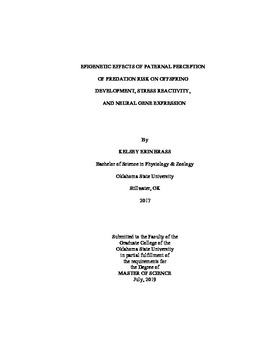| dc.contributor.advisor | Campbell, Polly | |
| dc.contributor.author | Brass, Kelsey Erin | |
| dc.date.accessioned | 2020-01-30T19:46:53Z | |
| dc.date.available | 2020-01-30T19:46:53Z | |
| dc.date.issued | 2019-07 | |
| dc.identifier.uri | https://hdl.handle.net/11244/323428 | |
| dc.description.abstract | In stable environments, parents able to transmit information such as predation risk should have offspring that are pre-adapted to the environment they will encounter as adults. While intergenerational epigenetic transmission of paternal experience has been demonstrated in mammals, whether paternal perception of predation risk can alter offspring phenotypes has not been investigated. We exposed male mice to a predator odor (2-4-5-trimethylthiazoline, TMT) and measured offspring behavioral phenotypes throughout development as well as adult neural gene expression and stress reactivity. We predicted that offspring of males exposed to TMT would exhibit decreased activity and increased anxiety-like behaviors relative to controls because these behaviors are analogous to anti-predator behaviors in the wild. Unexpectedly, we found that offspring of TMT-exposed males tend to be more active and exhibit fewer anxiety-like behaviors relative to controls. In the prefrontal cortex, we found evidence of decreased relative expression of Bdnf and increased relative expression of Nr3c2 in experimental offspring. Additionally, offspring of TMT-exposed males exhibited decreased baseline plasma CORT relative to controls. Previous work suggests that prey increase risk-taking behavior in areas with high predator density, suggesting potential tradeoffs between anti-predator behavior and activities such as foraging and reproduction. When considering such trade-offs, these results suggest that fathers exposed to predation threat produce offspring that are resilient to stress and, potentially, better adapted to a high predation environment. Importantly, this study provides evidence that ecologically relevant paternal experience can be transmitted through the germline and can exert consistent effects on offspring phenotypes throughout development. | |
| dc.format | application/pdf | |
| dc.language | en_US | |
| dc.rights | Copyright is held by the author who has granted the Oklahoma State University Library the non-exclusive right to share this material in its institutional repository. Contact Digital Library Services at lib-dls@okstate.edu or 405-744-9161 for the permission policy on the use, reproduction or distribution of this material. | |
| dc.title | Epigenetic Effects of Paternal Perception of Predation Risk on Offspring Development, Stress Reactivity, and Neural Gene Expression | |
| dc.contributor.committeeMember | Grindstaff, Jennifer | |
| dc.contributor.committeeMember | Wilder, Shawn | |
| osu.filename | Brass_okstate_0664M_16374.pdf | |
| osu.accesstype | Open Access | |
| dc.type.genre | Thesis | |
| dc.type.material | Text | |
| dc.subject.keywords | behavior | |
| dc.subject.keywords | epigenetics | |
| dc.subject.keywords | intergenerational inheritance | |
| dc.subject.keywords | paternal effects | |
| dc.subject.keywords | predator-prey interactions | |
| dc.subject.keywords | stress | |
| thesis.degree.discipline | Integrative Biology | |
| thesis.degree.grantor | Oklahoma State University | |
